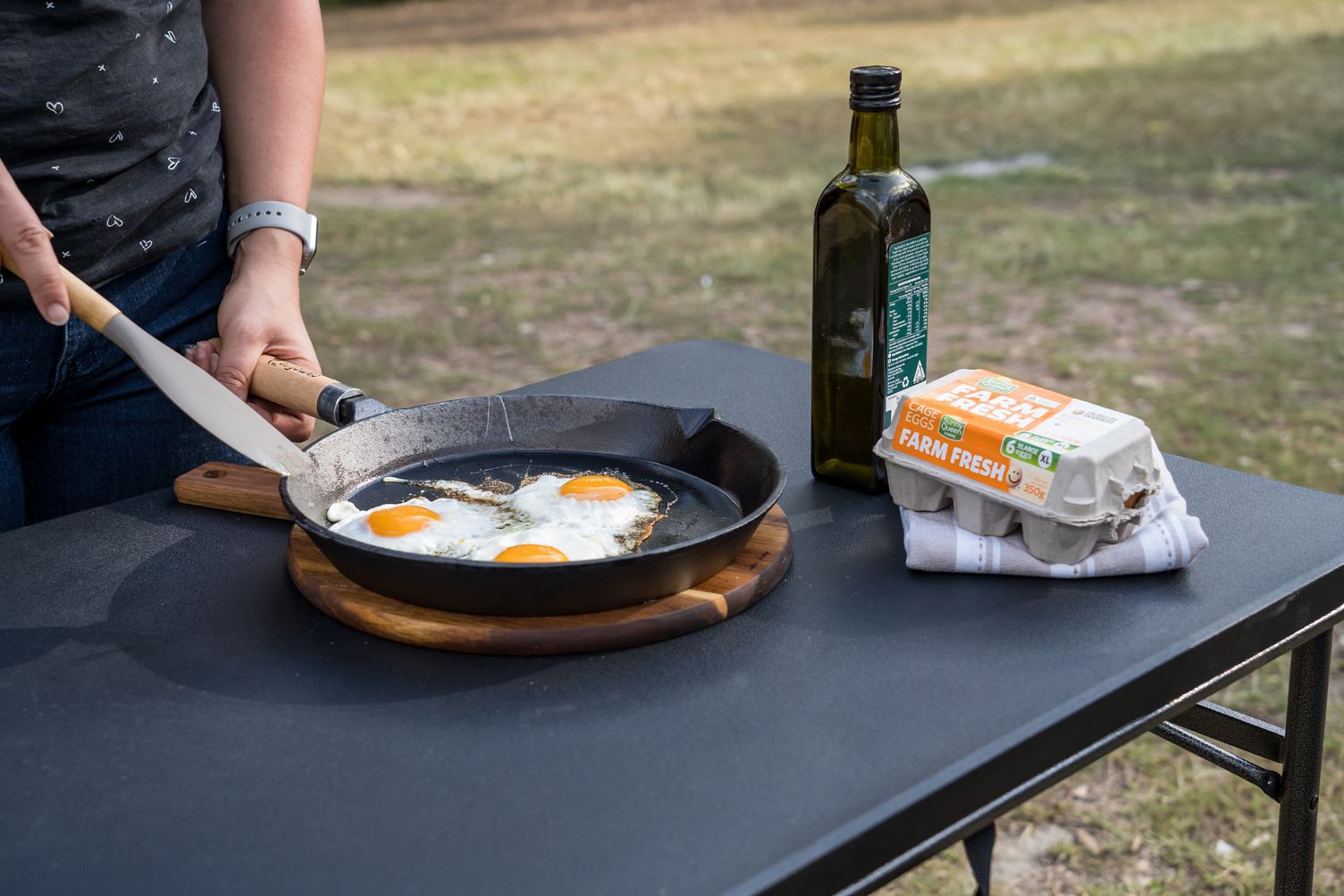 When you're camping, eggs are a terrific way to get your protein. If you know what you're doing, you should be able to pack them safely. On our most recent long-term camping trip to Barrington Tops, we wish we had packed them a little better. By the end of the trip, after all that hard wheeling up slippery tracks, leaving them in their carton stuffed into the side of the canopy just didn't cut it. In this blog we talk through some of the better strategies we came up with for our next trip.
When you're camping, eggs are a terrific way to get your protein. If you know what you're doing, you should be able to pack them safely. On our most recent long-term camping trip to Barrington Tops, we wish we had packed them a little better. By the end of the trip, after all that hard wheeling up slippery tracks, leaving them in their carton stuffed into the side of the canopy just didn't cut it. In this blog we talk through some of the better strategies we came up with for our next trip.
You can crack eggs into plastic bottles or zip-lock bags to take for camping and then freeze them before popping them into your camping icebox. Otherwise, you can transport them in their shells and protect them with an egg carrier. If you don't have access to a refrigerator, powdered eggs are a much safer alternative. Before you go camping with your eggs, there are a few things you should know. The easiest way to prepare eggs for camping is to boil them. Depending on where you are in the world, eggs done this way are referred to as 'hard cooked' or 'hard boiled.' If you don't know how to boil an egg, simply place it in a pan with cold water and cover it. Bring the water to a boil in a large pot. After four minutes, you can take the eggs from the water.
They'll become less runny with each minute in the water, but you shouldn't leave them in there for more than 10 minutes once the water begins to boil. (If you wait too long, you'll wind up with spoiled, green eggs.) You may then peel your egg whenever you're ready and consume it as a protein-rich snack with salt. You may also cut it up and combine it with mayonnaise to make a sandwich filler, or add it to salads and side dishes. Pre boiled eggs are the easiest and quickest way of getting a burst of energy so taking hard boiled eggs on a hike with you is a great idea.
Dehydrated Eggs (also known as powdered eggs) are useful for a camping trip because they have a shelf life of up to ten years. You won't have to worry about food sickness or breakages, either. (Once the packet is opened, the shelf life drops to around a year.) On your camping vacation, you can make scrambled eggs by mixing dried eggs with water, or you can use them for french toast or baking. They're approximately twice as expensive as fresh eggs, but the box lasts a long time. If you're thru-hiking and want to spice up your meals without getting food illness, the convenience is worth it.
If you're carrying pre-cracked eggs to cook later, split them up and put them in a plastic bag for each day of camping. To reduce spills, it's a good idea to double up on plastic bags. You can alternatively crack the eggs into a plastic bottle to avoid them cracking on your trek. These squeezy bottles are also fantastic to cook and store eggs as you can add seasoning and your choice of milk to them. This means you don't have to carry around extra spices or additives for your scrambled eggs. You can freeze the eggs before putting them in your camping icebox or portable camping fridge if you crack them into a container first. They'll stay colder for longer this way. (Because liquid expands when frozen, you can't put an egg in the freezer while it's still in its shell.)
Unless you have a camping fridge or cooler, we do not suggest bringing raw eggs with you because the risk of them spoiling isn't worth it. Salmonella is a pathogen that can be contracted by eating raw or undercooked eggs or chicken. The majority of people recover completely, however salmonella can be fatal. In any case, the symptoms are really uncomfortable. You can anticipate to have vomiting, cramps, diarrhoea, fever, headaches, and chills, among other symptoms. These kinds of symptoms can become life threatening if you are in the middle of a 3 day camping trip in the middle of nowhere.
When it comes to salmonella, incorrect storage increases the risk, so be careful not to allow your eggs get too warm on your next camping trip. Another reason campers are at risk for salmonella is that keeping your culinary equipment clean and disinfected is more difficult, especially on a thru-hike. On a bonfire or a two burner camping stove, it may be more difficult to judge cooking times, so take additional care to ensure your eggs are thoroughly cooked! You'll be hungry and unhappy if you don't have eggs for breakfast and discover that you've cracked them all on the journey up to your camping area.

It's a good idea to bring more food than you think you'll need, because being active in the great outdoors will make you hungry. If you encounter troubles with your culinary equipment, extra foods like trail mix and chocolates can be lifesavers! No one wants to open their bag to find a wet mess of broken eggs all over their clothes, so no matter how you store your eggs, keep them in an extra plastic bag for waterproofing.
If you're unsure about the freshness of your eggs, especially after a hot day, run a simple safety test on them. Simply crack your eggs into a pan or dish of water while still in their shells. You can cook them now if they sink and rest on their sides. You should avoid eating them if they float. Instead of tossing any stale eggs into the bushes, take them with you. You'll just draw wild animals to your tent if you leave them near your campground.
Put nothing heavy on top of eggs if you're transporting them in a camping icebox or portable camping fridge. It's a good idea to break them up and freeze them in a plastic bottle the night before you leave, as this will help keep them (and the rest of your food) cool. You can also acquire an egg container to keep your eggs safe while in transportation. If you're bringing raw eggs, keep them in the fridge. Go for farm-fresh eggs, which will keep for longer, taste better, and presumably have a better level of animal welfare than the eggs you get in the store. However, if you're travelling light or won't be able to keep your eggs refrigerated, dehydrated/powdered eggs are a better option. They're not as good as fresh eggs, but they're a whole lot better than food poisoning! After all, you'll be pleased to get some hot food down ya after a long day of hiking! If you are unsure about which camping icebox or how to pack one head to our category page to find out more: here.

Leave a comment